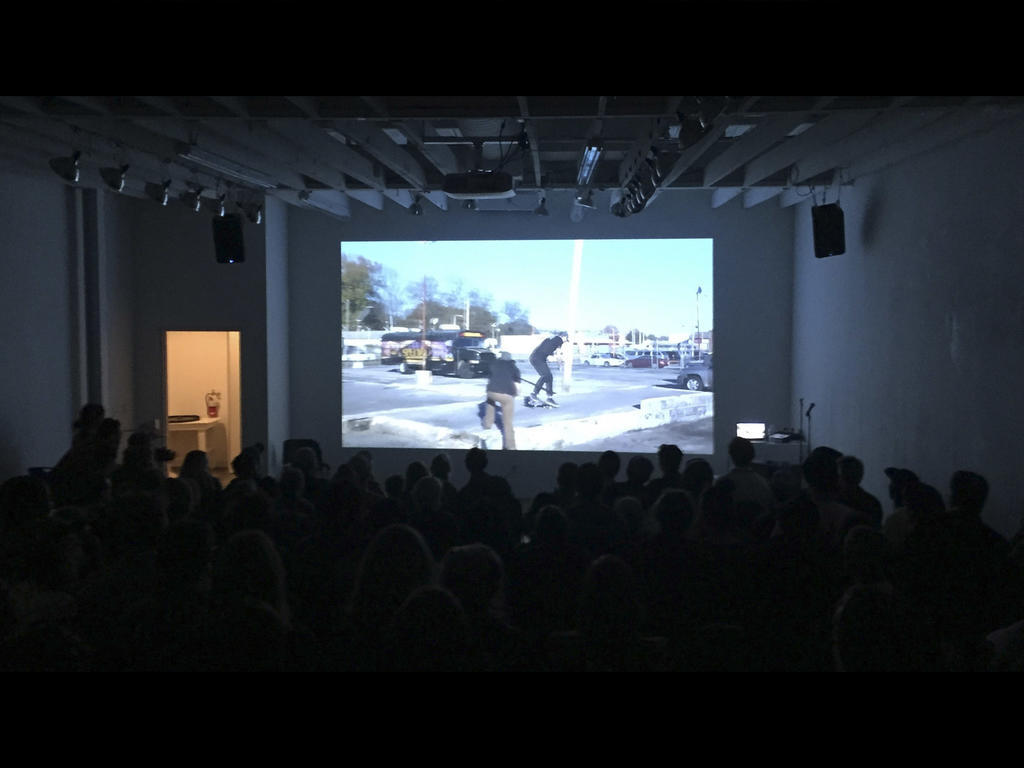On the evening of February 3rd, a diverse and energetic crowd filled Memphis’ Crosstown Arts on Cleveland Avenue. Local band Heavy Pull played loudly as skateboarding videos danced on the back wall. At 9:30, Rhodes College’s Kirkwood Vangeli ’17 took the stage with his cohort Zac Roberts of the University of Memphis. After a brief introduction, the projector lit up and the crowd cheered. For the next thirty minutes, Kirkwood and Zac mesmerized the crowd with the debut of their new film, Aesthetics, an inside look at the skateboarding scene in Memphis.
Both the screening and the movie itself felt distinctly Memphis. There was a racially, socioeconomically, and stylistically broad demographic of people, coming under one roof to enjoy a mutual experience with the community at large. It felt like a local event put on for local people, with the kind of Memphian friendliness that means you can’t go to the grocery store without seeing someone you know. That’s where Kirkwood’s involvement becomes special.
Born and raised in Dallas, TX, Kirkwood entered Rhodes College in Fall 2013 ready to pursue a path towards law school. A skateboarder since he was 8 years old, he came to college knowing he wouldn’t do much skating within the confines of Rhodes. So shortly after arriving, Kirkwood struck out into the community to pursue his passion.
He broke into the local scene by becoming a regular at Al-town, a do-it-yourself skate park in the Midtown area. There he met skateboarder, Memphian, and co-producer of Aesthetics, Zac Roberts. “The Memphis skateboarding community is super welcoming,” says, Kirkwood, “but you need to be consistent. You’re not going to be part of the community if you show up once, leave, and never come back. You have to earn your place in it like anything. And you don’t earn it by being good at skateboarding; you earn it by being a good person and wanting to be there.”
In May 2015, Kirkwood competed alongside Zac at a local competition at the old Mid-South Coliseum. Put on by Aaron Schaffer, one of the prominent “hype-men” and organizers of Memphis skateboarding, the event was one of many tournaments, clinics, and other gatherings for local skaters in Memphis. After the tournament, Zac and Kirkwood went to Wooddale High School to film some skateboarding clips. That’s when, after realizing they had captured some good clips, the idea to make a full-length video was born.
For the next nine months, Kirkwood and his friends would do just that. Filmed predominantly in the Memphis area, the film that would become Aesthetics was a stream-of-consciousness, join-us-if-you’re-interested effort. Kirkwood says, “During the process of filming, people would just show up and want to skate with you, and we weren’t exclusive or anything. It wasn’t about what you could do, it was about just being together and skateboarding.” About a dozen skaters have clips in the film in locations spanning from Collierville to Bartlett to Downtown.
The theme of the movie ultimately became the artistic expressiveness of skateboarding, and it encapsulates the camaraderie and mutual inspiration that pervade the Memphis skateboarding community. Like with any form of artistic expression, the skateboard becomes a tool through which to channel one’s creativity. “When you pick up a skateboard and you have that feeling like you can produce what you want to produce, you can do what you want to do—that’s what you work so hard to have,” says Kirkwood.
Fast forwarding through nine months of filming, one month of “sleepless nights and double days” of editing, and the stress of planning the event, the debut of the film symbolizes a triumphant effort at capturing the spirit of skateboarding in Memphis. They settled on Crosstown Arts for the premiere because, says Kirkwood, “It goes along with what we’re trying to do, which is present skateboarding as an art, not a competition. Crosstown wants you to come in and show your work, and it’s a good way of getting your work exposed to people who may not even be interested in skateboarding. It was Crosstown from the beginning.”
In the end, the screening went without a hitch. The crowd was as raucous as it was diverse. “I can’t even describe how it felt,” Kirkwood remembers. “It was so great. If you’ve ever gone into a room and know that everyone was there for something you created, it’s just such a surreal feeling.” After the screening, Kirkwood and Roberts had a surprise for their audience and, particularly, for one of their skateboarding cohorts, 16-year-old Memphian Adrian Akin. They announced the opening of their very own skateboarding company, called Fluxus, and debuted their first deck design. Aesthetics was dubbed a Fluxus production, and Akin was named as the company’s first sponsored member.
Kirkwood’s success exemplifies what can happen when Rhodes students take a stake in the greater Memphis community. A political science major, Kirkwood’s project seems a far-cry from his academic focus. But, says Kirkwood, “Rhodes really helped me gain the confidence necessary to express to the world what I truly want to do, because I don’t think I had that before. It’s opened up the idea of being a unique individual for me and it’s done that through courses, my experiences working with college events, and different things like that. It’s given me personal confidence, and I think that’s really valuable.”
Kirkwood is currently working on an independent study with Professor Robert Saxe of the history department on skateboarding and art in Memphis, and plans to do a Rhodes Institute for Regional Studies program this summer on the same topic. Fluxus will continue production and expansion as Kirkwood and Zac source more board designs from local artists. Ultimately, Kirkwood hopes to get a Watson fellowship and pursue his passion worldwide, documenting and analyzing skateboarding in its various forms internationally.
Fluxus is on Instagram, Facebook, and Youtube, where you can also view Aesthetics.
by Kenneth Piper '17
